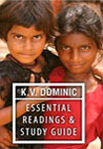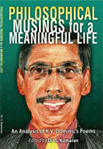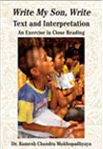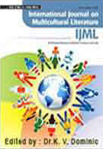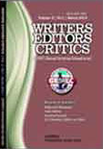Details of Critical study
Stephen Gill—the Bard of World Peace: A Historicist Analysis of his Poetic Musings
Year Of Publish:
Stephen Gill—the Bard of World Peace: A Historicist Analysis of his Poetic Musings
K. V. Dominic
Stephen Gill, the bard of world peace and anti-terrorism is an Indian English poet and a Canadian poet at the same time. But the epithet which suits him most is that of a world poet. Poet Laureate of Ansted University, Gill strongly believes in a democratically elected world government and in that sense he cannot be chained to the narrow boundary of a nation; in fact he belongs to the whole world. Global peace and social concerns are the main areas of his interest. Born in Pakistan and brought up in India, Stephen Gill is now settled in Canada from where he travels widely to the East and Europe disseminating the gospel of peace. As the Dove in his poems, he is flying to the turbulent areas where the ‘maniac messiahs’ (quoting his own powerful phrase) dance in ecstasy over the corpses of innocent masses. Rays of hope emit through his poems and lectures and they soothe the aching minds like a balm. It is really pathetic and ironical that he has to face threat and risk to his life from his own native land.
Stephen Gill has written more than twenty books including novels, literary criticism, and collections of poems. His poetry and prose have appeared in more than five hundred publications. His latest work and masterpiece The Flame was published by Vesta Publications, Canada in 2008. Stephen Gill has been conferred four honorary doctorates, besides several awards from Canada, the USA, England and India. The major works of his poetic corpus are: Flashes (2007), Songs before Shrine (2007), Shrine (2008), and The Flame (2008).
Several critics and poets have lauded Stephen Gill with well-deserving epithets while evaluating his poetry. It is quite relevant and worth quoting a few of them. Prof. R. K. Singh and Mitali De Sarkar write:
Stephen Gill has taken writing as his mission or goal because his humanitarianism is seriously challenged when se sees waste, loss and mutual destruction again and again. He stridently denounces forces that promote extreme and vicious nationalism or fundamentalism. He liberates his mind through his poems and reveals his sociopolitical concerns by exposing human animus that heighten existential agonies of modern life. . . . Gill delineates a basic struggle of the soul, the mind, and the body to comprehend life in its totality; what he communicates through the poetic medium is a confrontation of his whole being with reality and his response to it in a pungent and straight-forward manner. (qtd. in Arora, “Critics on Stephen Gill” 205)
In the words of Dr. D. C. Chambial, “Stephen Gill is a true humanist who wages a war against the evil designs of men which drag them into the pit of inhumanity” (qtd. in Arora, “Critics on Stephen Gill” 204). Dr. K. S. Gill is of opinion that “Democracy, war, peace, freedom, fanaticism—all form grist to Stephen’s mill. . . . His sensibility takes in its ambience the entire spectrum of human experience. It is global consciousness wedded to compassion at its best” (qtd. in Arora, “Critics on Stephen Gill” 207). Dr. Jaydeep Sarangi compares Gill to Jayanta Mahapatra: “Like Jayanta Mahapatra, Gill is a Christian, his dove symbol can be compared to “rain” (symbol of unity), a symbol in Mahapatra’s poetry. Rain brings assurance to life. “Dove” stands for totality in life. Stephen Gill reveals this complete vision of life in a harmonized Canadian identity” (qtd. in Arora, “Critics on Stephen Gill” 209). K. K. Srivastava finds, “His image is lucid, candid, thought-provoking and simple. His poetry, like that of Benedict de Spinoza, urges for unity of all things. Stephen Gill combines the role of a poet, a seer, and a seeker in an exquisite way” (qtd. in Arora, “Critics on Stephen Gill” 211). Dr. Nilanshu Kumar Agarwal writes, “Through his works, he exhorts the people of the world to shun the reptiles of ethnocentric and jingoistic prejudices, racial antagonism and religious obscurantism” (qtd. in Arora, “Critics on Stephen Gill” 212). Dr. Shaleen K. Singh is of opinion that, “Though his poems are full of dismal and terrible pictures of terrorism and its consequences, yet they encourage man to ride through the rough tempestuous sea of life and cross all the boundaries of callous calamities and dreadful disasters” (qtd. in Arora, “Critics on Stephen Gill” 217).
A writer’s work can be best studied and understood only if you learn his biography and the background for his writings. New Critics may oppose my view and argue that the author is dead once the work is out. In the case of Stephen Gill how can one set aside history, ignore his biography and hard experiences, and analyse his poems with a dispassionate, objective mind? To Gill, poetry is the outpouring of his bitter experiences, a confession of his aching heart and a longing for a happy, peaceful world.
Stephen Gill was born in Sialkot in Punjab, which is now a part of Pakistan. When India was divided in 1947, his father, who was an exporter of the sports goods in Sialkot became frustrated and had to leave with his family to New Delhi for settlement. Stephen Gill had his school education in New Delhi, graduation in Punjab University and post graduation in Agra University. “He got the three-year contract job of a teacher in Ethiopia where he passed his life comfortably from the point of peace and money. But he felt uncomfortable because of zero intellectual activity” (Arora, “Pain in Pen” 2). The surroundings there were not favourable for his writing and intellectual activities. From there he applied for a scholarship at the University of Ottawa, which he won and thus completed his Doctorate Degree in English literature in Canada. He was offered a scholarship to study at Oxford and a fellowship to study at Ottawa University. Gill taught English for two years in Ottawa and in 1971 he came to Cornwall where he married Sarala, a teacher of nursing at St. Lawrence Community College. In 1974 Gill established his own publishing house, ‘Vesta Publications’ in Cornwall. “With his one son Ajay and two daughters Rekha and Sarita, he is well settled in Canada from where he is serving the world through his literary oeuvre with a vision—vision of global peace and World Federalism” (Arora, “Pain in Pen” 4).
The partition and its diabolic aftermaths created incurable wounds in Stephen Gill’s heart. He being a Christian was an alien to his Hindu schoolmates and neighbours in New Delhi. This discrimination and alienation was unbearable to the tender mind of young Gill. He, like his parents, longed to flee from the turbulent Delhi to some calm area where Christians resided. About the massacre of 1947 Gill writes in his essay, “Journey of Stephen Gill: Autobiographical”:
In 1947, shortly before and after the partition of India, the Hindus, Muslims and Sikhs got involved with killing each other. The Hindus and Sikhs were on one side and Muslims on the other. Humans were killed in the midst of a crowd because they happened to look different because of their dress or shaving pattern. Someone would come close and stab someone either in the back or in the stomach right in the waves of people into which the stabber melted in no time. In several cases, the stabbers could be friends, neighbours or anyone who knew the religion of the victims. Many made use of the lawlessness to settle old scores. (11)
People were afraid to stay at home and there were several families in Gill’s neighbourhood at Delhi who would leave their homes in the morning and return in the evening, carrying boxes on their heads. When the occupants of the house fled or were killed, the rioters looted whatever they could. Gill continues in his autobiographical essay:
I cannot forget the climate of New Delhi which emitted a strong offensive smell due to the rioting dead bodies in the houses. It was said that the government had their buses loaded with bodies to be burnt somewhere outside the city. The authorities could not find adequate loaders because of the stench. Even the water became polluted because several dead bodies were thrown in the Yumana River which was the source of supply for the city residents. (Gill, “Journey of Stephen Gill” 14)
Gill remembers the wise steps that his parents had taken to send his two elder sisters to a convent because young families at home were harbingers of tragedy. Gill’s trust in humanity was shaken so badly in those days that he had to struggle with himself patiently for a long time to recover it. He began to realize at an early age that it was important for people to associate themselves with organizations or their groups closely for reliance in their bad days. Gill remembers how
young girls were stripped naked in procession; their breasts were cut off and on their bodies religious signs were carved. Old men and women were butchered on the spot. Hundreds of women killed themselves with poison. Hundreds of them jumped into wells to end their lives. Hundreds of them committed suicide in other ways. Those who fell in the hands of fanatics, preferred to remain unknown, instead of facing their families. It was a chapter of violence and terror, insults and degradation of women. Jam-packed trains ferried hundreds of thousands of people back and forth across the border of India and Pakistan, who spread the stories of horror caused by religious bigotry. (Gill, “Journey of Stephen Gill” 18)
The suffocation caused by the thick smoke of fear and distrust shaped Gill’s decision to leave India. He always thought that the Westerners would welcome him openly when they would find a Christian from India. He got this impression when he saw the followers of other religions flocking together in India. But truth dawned on him in Canada and he found that churches did not teach such things. For Westerners, he realized that Jesus preached to love ones neighbours, to help the needy, poor and destitute that means to love every human without creed and nationality. Even after reaching Canada, his mind was not calm. The atrocities in India continued to haunt him. He shares it in the autobiographical essay:
No amount of ink can describe the frustrations of my anguished soul that went in search of an oasis. It was a shock when I realized that the darkness I left behind had been chasing me continuously. The thought of cruelty of humans always remained in my mind like my own shadow. The more I thought of it, the more I became obsessed to write about it. The violence that I had seen and read and heard was not committed by the followers of one religion; rather by the followers of the Hindu, Muslim and Sikh religions. In India, violence was against Muslims; in Pakistan, it was against the Sikhs and Hindus. . . . My farewell to the country of my birth was not to find a land to dig gold. It was to dig the gold of my safety where I could grow the crop of my thinking and where I could live with respect and dignity. No doubt, Canada has its own cases of discrimination, but they are in a more disguised and civilized way. Moreover, there are remedies, though costly and time-consuming. But they are there. For the first time I found pride and freedom in the expression of my beliefs openly. (Gill, “Journey of Stephen Gill” 24-25)
Having explained the biography, creative inspiration, and the poetical background of Stephen Gill’s poems, let me enunciate how they influenced and made expression through his poetical musings. Stephen Gill’s Flashes is a poetic collection of two hundred and fifty two haiku divided in four sections, titled “Love,” “Peace and War,” “Social Concerns” and “Miscellaneous.” Gill is quite aware that these three-lined stanzas do not keep the rules and parameters of Japanese haiku or its counterpart in the West. “Modern haiku differs from the classic haiku because of its flexibility in format as the practitioners of modern haiku do not confine themselves to the fixed format of 5-7-5 but they change it according to their whims. They prefer to compress an experience in the narrow span of 3-5-3 format or even narrower 2-3-2 format or like” (Arora, “Flashes in Flashes” 78-79). Gill expresses his stand regarding haiku by giving a sub-title ‘Trilliums in Haiku Spirit’ to Flashes. Trillium is a plant having a whorl of three leaves at the top of the stem with a single three-petaled flower. Three leaves symbolically stand for the three lines in his compositions which are composed keeping haiku in mind. “He is against the use of telegraphic language which mars the beauty and grace in haiku. Avoidance of articles, prepositions, adverbs and verbs is considered a welcome sign by the pundit of haiku but Gill does not vote for such parameters though he uses them sparingly” (Arora, “Flashes in Flashes” 80). The first section titled, “Love” comprises seventy four haiku. As the title suggests, all the haiku are on the theme of love, particularly between a lover and a beloved. “Love is the thread that binds the two souls in a relationship that cannot be easily broken. It is itself a great season that includes all other seasons” (Arora, “Flashes in Flashes” 81). The close affinity between nature and passion of human beings is expressed in the following haiku:
Lovers are flowers
passions blush as roses
smiles are buds opening. (Gill, Flashes 14)
The second section “Peace and War” consists of thirty haiku. The poet in Gill sees the present scenario painted with the dark colours of hatred, jealousy and destruction. He feels the need to paint them with the colour of peace. The poet is lying by a serene river but mosquitoes and past bite him:
Unhappy I lie by a serene river
mosquitoes and past bite me
failing to break my spirit. (Gill, Flashes 30)
The biting of mosquito reminds him of his bitter past experiences. He is content and triumphant that the terrorists or their monstrous atrocities could not conquer his spirit. The poet has firm faith in love. He does not advocate in extending boundaries through war. He recommends nations to extend love:
Nations that extend love
beyond their boundaries
bloom boundlessly. (Gill, Flashes 31)
The third section “Social Concerns” contains fourteen haiku. The poet thinks of society and its amelioration. “In his opinion, there is one tree of humanity and all the human beings are its leaves” (Arora, “Flashes in Flashes” 96). Gill’s concern for equality is discerned in the following haiku:
One tree
humans are leaves
God is the source. (Gill, Flashes 36)
Gill has written one hundred and thirty four haiku under the last section titled “Miscellaneous.” They are on varied subjects untouched in the previous sections. Most of them are on beauties of nature. The aesthetic beauty in the following haiku is captivating:
Wrapped in silvery shawl
moaning sea raises finger
to close eyes of the moon. (Gill, Flashes 44)
Songs before Shrine is a collection of eighty one poems presenting the world of creation. God has created nature, animals and human beings. Sudhir K Arora writes on the book:
All human beings are equal as all the children of one and the same God. All are initially good and gentle but it is Satan who tempts some with the intention of corrupting them. To some extent, Satan succeeds in using some human beings as robots for destruction. Hence, in the background of creation, the destruction is always present. Wherever there is destruction, there is creation. Creation and Destruction are associated with each other, as God whose nature is creation is never tired of creation, while Satan, whose nature is destruction, feels proud of himself in destructing the creation of God. (“Creator and Creation in Songs before Shrine” 23)
The terms ‘Creator’ and ‘Creation’ are also used in another sense. A poet is a creator himself as he recreates a beautiful world with words for the betterment of the society. He sees the satanic forces in the contemporary society who is involved in the act of destruction. He takes it his duty to recreate an ideal world which the crazy barbarians have been destroying. In this sense he is a god and his poetry, the created world. Gill foresees the plight of humanity and the helplessness of the Creator in the lines:
If the nuclear bombs drop
Will God save anyone?
Who will cry, who will console?
Will not all be lost? (Gill, Songs before Shrine 31)
The second coming of Christ is hinted in the following lines:
When I see
the good victim of violence
fanaticism on the increase
hatred, war, no peace
greed tightening its grip
I think of
the coming of Christ. (Gill, Songs before Shrine 49)
Songs before Shrine is a genuine proof of the creative genius of Stephen Gill. It is “a peep into the optimistic outlook of the poet in Gill who, through the songs of peace, never lets the readers feel depressed at any stage” (Arora, “Creator and Creation” 41).
Stephen Gill’s Shrine is a collection of sixty seven poems about peace and social concerns. Sudhir K. Arora writes on the book:
The poet in Gill is grieved over the contemporary scenario which is dotted with the bloody colour of bigotry, murder, rape, torture, suffering, pain, insanity, terrorism etc. He is not pessimistic when he diagnoses the scene but is quite optimistic as he offers remedy through the prescription of peace which can be available through the concept of Federal World government. He believes in action plan and it is his faith that one day, the world will be fed up with the bloody game of terrorism. It will make its immune system strong with the united efforts to wage a war against the terrorism. Where there is peace, creation is there. Where there is creation, prosperity reigns there. Peace is the path that leads to prosperity. (“Peace and Social Consciousness in Shrine” 42)
The damages caused by the war fever are delineated in the following lines:
War fever
kills the lamb
drags into the vortex of hatred
causes a thirst for power
admires the roar of the canon
and urges
crushing of peace (Gill, Shrine 54)
Gill’s faith in democracy and how it can serve the people as a tree is expressed in the following lines:
The plant of democracy
blossoms into
the fruits of abundance
and its branches dance
to the tune of a song
which brews a wine for peace (Gill, Shrine 65)
The destruction caused by religious fanaticism is pictured in the following lines:
It breeds
the daughter of fire
storm
sword and wound
and leads
the adders of dread
destruction
disdain
and distaste (Gill, Shrine 66)
Stephen Gill has written this book with a mission. He wants to spread the message of peace and discuss the social issues. He has succeeded in making the masses aware of the real intentions of the enemies of peace by unmasking them. To quote Arora:
He recommends the two ingredients—tolerance and non-violence to realize the ever cherished goal of Peace. The so-called religious authorities or messiahs blackmail the common people emotionally and push them into the river so that they may start flowing in one direction as desired. The need, as the poet in Gill feels, is to make the masses aware that they are being misled. . . . All the poems in Shrine reflect this spirit more or less. (“Peace and Social Consciousness in Shrine” 56)
The Flame, Stephen Gill’s magnum opus, consists of eight parts—sixty two long cantos covering 152 pages. The entire poem is in free verse composed of lines of varied length—monosyllable to more than ten syllables. The rhythm is exceptional as the reader never stumbles on any syllable while reading. Alliteration and assonance, which are in plenty, add to the sonority of the lines. The use of imagery decorates the noble theme of the poem.
The poet has written a long preface which runs to twenty one pages. It is a preamble or proclamation of Gill’s vision, philosophy, poetic birth and development, as well as his opinions on the art of verse making. The poet has attempted to explain the relevance of the title and the different connotations and symbolic meanings of the term ‘flame’. The Preface is also a treatise on anti-terrorism.
Part One consists of nine cantos. It is a devotional song. God is conceived by the poet in all possible, abstract terms of qualities, beauties and might. God brings this disharmonious world in harmony. He is the absolute harmony, absolute peace, and absolute radiance luxuriating richness of blossoms. God is the supreme melody and nirvana restraining brutalities. He is manna for those who need equity; supreme fountain for sages; respiration of the musical notes; monarch of the ray; ruptures of illumined waves; mother of all musical strings; sickle that uproots bushes; boon from justice and lotus that buds in the waters of uncommon patience. There are several scintillating and pictorial images that enchant the readers’ mind. God’s mighty radiance is portrayed as:
You are
the softness of the radiant might
that melts the mist,
stirs the soul of clouds
pushes down the rain showers
which kiss the dry lips of earth
and the wordless sonata
that moves the sharp white beams
of the moon. (Gill, The Flame 32)
Part Two narrates in detail the destruction caused by the terrorists or, in the poet’s phrase, maniac messiahs. There are six cantos in this part. The terrorists are considered by the poet as avatars of savagery who mow down defenseless innocents. Gill presents before the readers a terrorist-hit city as original as it can be fancied. The temple of the flame has grown treacherous in the thickening fog. The steel door with red drops of blood crumbled. The day opened its dance with a frightening boom.
The birds that reposed
on secure boughs
flew in fear.
For days
sparrows, roses and dawns
forgot their songs. (Gill, The Flame 50)
A man is found hanging out of a window with bleeding head. Another man had a filing cabinet imbedded into his skull. A body was found as if it came out of a meat grinder. Another body was slumped in a sitting position. A man was split into halves. Sample the two horrible scenes:
There was an arm and a head
and a woman’s leg
from the knee down
the rest was buried under the rubble. (Gill, The Flame 53)
and…
A woman on the street
rested charred and dead
another,
naked from the waist down. (Gill, The Flame 54)
Part Three, consisting of three cantos, focuses on the rescue operation on the terrorist-hit areas. Volunteers risk their lives and search every part of the debris for any life trapped there. It is hard to move there and breathe. Doctors and fire-fighters rush on to the place. Remote-sensing specialists and squads of tail-wagging searchers also come soon. Ropes, optic cameras with lights and other devices to detect breathing are deployed. Within an hour, ambulance, excavators, fork lifts and trucks arrive everywhere. Helicopters buzz over heads. Police provide security sealing off the downtown. The part ends with a sad note of despair:
With the mounting mass of courage
they moved forward
with crowbars and axes.
If someone recovered an adult
or a child
he was rushed
to the stress center
because the exhaustive search
mentally and physically was exhausting.
The perfidious conditions
stressed even dogs
who felt dispirited
for not finding anyone alive. (Gill, The Flame 68)
Part Four is dedicated to the eternal Flame. There are four cantos in this part. It also deals with bomb blast by the terrorists, this time a day-care centre. It is morning. After breakfast the kids are ready to paste cotton balls onto paper cut outs. Suddenly windows come rushing in and the ceiling begins to drop. Some kids become soundless; others stare or cry. They do not know how to run, where to hide and how to crawl under desks. The day-care centre disappears as a wax toy in the raging fire of the wrath. Mark the excerpt for the indifference and numbness of the public to the atrocities:
There was no wailing
no screaming
over the earthshattering slaughter
that pulverized the leaves
of the young season
untouched by the outburst of cyclones. (Gill, The Flame 79)
Time, being helpless watches “the ethical poverty of the zealots / who frenzied on the wildness of malice / struck random blows / to the beauty of my flame” (Gill, The Flame 79)
Part Five has three cantos. It tells in detail about the aftermath of the nursery school blast. A medical camp was opened for the wounded kids in a parking area. Nurses soaked in blood rushed after improvised surgeries. Investigators and relatives of the kids filled the hotels. Press reporters, television transmission trucks and photographers woke up the sleepy town into the capital of media. Days were filled with funerals. Some people searched for their dear ones in the crowd who assembled for funeral. It was very difficult to identify the dead bodies. Parents were asked to provide foot prints and specify the jewellery or the clothes their children wore. “Forensic experts staggered / when they matched up hands, / jawbones / and flesh with names” (Gill, The Flame 86). Victims went to hospitals with bruised and mutilated bodies.
Part Six contains six cantos. The poet asked the blood spillers if they heard the silence of the infants in the cradles of terror or the woes of mothers in the winter of their lives. He was certain that the maniac messiahs had felt uneasiness or tightness of heart before they did the diabolical act. The terrorists’ fiendish act might have made Nature weep.
Who can tell
if they glanced at the dawn
unfolding her apparel
to cover their perversions.
The heavenly bodies
must have wept in disgrace
for their impotent rage to burst
the blisters of shocking atrocities
wrapped in a shroud of secrecy. (Gill, The Flame 90)
Part Seven is the longest one with nineteen cantos. The terrorists have polluted the air with dust, smoke, fog and clouds so much that the poet can not view the eternal flame, the sun. The poet complains that none can engage in his routine work under the warmth of the flame. The orphaned children have no fathers or mothers to bless them. We need the softness of the sun’s light to weed out spite, darkness, evil, war and misery.
We need the grace of your presence
to weed out the bigotry
the cruelty
the fanatic howls
the fear
the sickness
and for mosaic to refine its gem
for equality to shine. (Gill, The Flame 110)
Part Eight, the concluding one, has ten cantos. The poet seems to be optimistic and full of hope. If the pangs of the separation—parting of the sun—ever prick him, he will clasp the soul of the night or dissolve the dawn’s freshness in his veins.
If I fail to see you there
I shall look
within the petals of the rose
and
the wind that whispers
with the restless clouds
above the heights of the hills.
I shall mark your shadow
also in waterfalls. (Gill, The Flame 131-132)
The Flame is so superb a poem in theme and style that prosaic words cannot display its grandeur and beauty. If an attempt is made, it will result in disfiguring the dazzle of the flame. The chief beauty of The Flame lies in the use of imagery which is present in every line. The poet in Gill has attempted not to repeat the previously used words and phrases. Alliteration and assonance are the figures that are sprinkled like summer showers on the canvas of The Flame. The Flame, which is an epic on anti-terrorism will immortalize Stephen Gill and earn him more laurels.
Let me conclude this article asserting and substantiating historicism in the poems of Stephen Gill. Gill’s poetry is a product of his past life. He is indeed the true representative poet of the current, turbulent, terrorist-hit world. He is poet in the true sense of the word—a sage, prophet and saviour of the world. If Nobel Prize Committee wants to confer the award for Peace to a writer, they needn’t search any other name. I hope and envisage that time is not far away when Stephen Gill will be awarded Nobel Prize either for Literature or for Peace.
Works Cited
Arora, Sudhir K. “Critics on Stephen Gill and His Poetic Volumes.” The Poetic Corpus of Stephen Gill: An Evaluation. By Sudhir K. Arora. New Delhi: Authorspress, 2009. 201-218. Print.
—. “Flashes in Flashes.” The Poetic Corpus of Stephen Gill: An Evaluation. By Sudhir K. Arora. New Delhi: Authorspress, 2009. 78-108. Print.
—. “Pain in Pen: The Poet in the Making.” The Poetic Corpus of Stephen Gill: An Evaluation. By Sudhir K. Arora. New Delhi: Authorspress, 2009. 1-22. Print.
—. “Peace and Social Consciousness in Shrine.” The Poetic Corpus of Stephen Gill: An Evaluation. By Sudhir K. Arora. New Delhi: Authorspress, 2009. 42-56. Print.
Gill, Stephen. The Flame. Canada: Vesta, 2008. Print.
—. Flashes (Trilliums in Haiku Spirit). New Delhi: Imprint, 2007. Print.
—. “Journey of Stephen Gill: Autobiographical.” Shrine. (First Published by World University Press, 1999). Allahabad: Cyberwit Press, Fall 2008. 1-27. Print.
—. Shrine. (First Published by World University Press, 1999). Allahabad: Cyberwit Press, Fall 2008. Print.
—. Songs before Shrine. New Delhi: Authorspress, 2007. Print.

